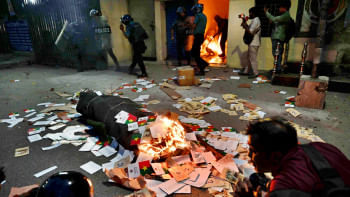US prodding Musharraf to share power with Benazir
The Bush administration, struggling to find a way to keep Gen Pervez Musharraf in power amid a deepening political crisis in Pakistan, is quietly prodding him to share authority with a longtime rival as a way of broadening his base, according to American and Pakistani officials.
General Musharraf, an important ally since the Sept 11, 2001, attacks, has lost so much domestic support in recent months that American officials have gotten behind the idea that an alliance with Benazir Bhutto, a former prime minister, would be his best chance of remaining president.
The two met in an unannounced session in Abu Dhabi on July 27, but neither has publicly admitted to the meeting. Since then, many in Pakistan have heard the rumours and voiced their doubts about the workability and political wisdom of such a deal, and American officials concede that the proposed power-sharing could come with problems as well as benefits.
But after weeks of unrest in Pakistan, the American officials say a power-sharing agreement that might install Benazir as prime minister could help defuse a confrontation in which General Musharraf has already flirted with invoking emergency powers. Administration officials have said they fear that General Musharraf could eventually be toppled and replaced by a leader who might be less reliable as a guardian of Pakistan's nuclear arsenal and as an ally against terrorism.
Even if General Musharraf were to insist on remaining as the country's military leader, American officials say that sharing power could bring a more democratic spirit to Pakistan, which has been a quasi-military dictatorship since 1999, when General Musharraf seized power and ousted Benazir's successor, Nawaz Sharif.
Even in supporting a power-sharing agreement, the American officials say they worried that any diminution of General Musharraf's power could only complicate American counterterrorism efforts at a time when al-Qaeda is believed to be rebuilding in Pakistan's tribal areas. They also say that Benazir's return could fuel Pakistani nationalism and kindle new calls for Pakistan to distance itself from Washington.
Benazir has been holding talks in recent weeks with senior Bush administration officials, including Zalmay Khalilzad, the United States ambassador to the United Nations, with whom she met privately late last week. Administration officials have taken pains not to endorse a power-sharing agreement publicly, so as not to seem as if the United States is trying to influence Pakistani politics.
But Secretary of State Condoleezza Rice did discuss the idea of a power-sharing arrangement when she called General Musharraf last week at 2 am in Pakistan to warn him not to declare emergency powers, American and Pakistani officials said.
Benazir and General Musharraf have a personal history going back many years. He was her chief of military operations when she was prime minister, yet he has said repeatedly that she would not be allowed to return before the coming elections. In fact, one of the biggest obstacles to any possible deal is whether Ms. Bhutto would demand that General Musharraf relinquish his post as army chief of staff before agreeing to a power-sharing deal. Benazir has said in the past that she would demand this, but there have been suggestions in Pakistan in recent days that in order to salvage a deal, she may be willing to concede that point.
Several Bush administration officials agreed to talk about the American role in the discussions but refused to speak for the record because of the delicacy of the talks.

 For all latest news, follow The Daily Star's Google News channel.
For all latest news, follow The Daily Star's Google News channel. 



Comments